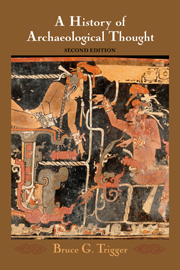Book contents
- Frontmatter
- Contents
- LIST OF ILLUSTRATIONS
- PREFACE TO THE SECOND EDITION
- 1 Studying the History of Archaeology
- 2 Classical and Other Text-Based Archaeologies
- 3 Antiquarianism without Texts
- 4 The Beginnings of Prehistoric Archaeology
- 5 Evolutionary Archaeology
- 6 Culture-Historical Archaeology
- 7 Early Functional-Processual Archaeology
- 8 Processualism and Postprocessualism
- 9 Pragmatic Synthesis
- 10 The Relevance of Archaeology
- BIBLIOGRAPHICAL ESSAY
- REFERENCES
- INDEX
9 - Pragmatic Synthesis
Published online by Cambridge University Press: 05 June 2014
- Frontmatter
- Contents
- LIST OF ILLUSTRATIONS
- PREFACE TO THE SECOND EDITION
- 1 Studying the History of Archaeology
- 2 Classical and Other Text-Based Archaeologies
- 3 Antiquarianism without Texts
- 4 The Beginnings of Prehistoric Archaeology
- 5 Evolutionary Archaeology
- 6 Culture-Historical Archaeology
- 7 Early Functional-Processual Archaeology
- 8 Processualism and Postprocessualism
- 9 Pragmatic Synthesis
- 10 The Relevance of Archaeology
- BIBLIOGRAPHICAL ESSAY
- REFERENCES
- INDEX
Summary
Niels Bohr said that the most fundamental truths were so profound that quite the opposite ones were also true!
leo klejn, Metaarchaeology (2001a), pp. 55Papers that end with the depressingly banal conclusion … that “we should look for a middle ground” should be banned.
matthew johnson, Archaeological Theory (1999), p. 187There is no evidence that in their interpretation of archaeological data archaeologists today are less influenced by the milieu in which they live than they were formerly. Archaeological interpretations consciously and unconsciously (it is often impossible to determine which) echo current concerns. These relate to a vast array of issues, including globalization, American hegemony, international terrorism, pandemics, rising debt loads, environmental pollution, the changing role of government, and the disintegration of the family. Current understandings of ideologies, such as Marxism, neoconservatism, and nationalism, also color interpretations of the past. Like everything else in modern society, these biased understandings are growing more varied, complex, and individualized and are changing more rapidly than ever before. By contrast, the history of archaeology suggests that a growing body of archaeological data offers ever stronger resistance to the misapplication of such ideas and the specific misinterpretation of archaeological evidence. Although there can be no certainty about the “objectivity” of any specific interpretation of archaeological findings, the chances of archaeologists construing such findings in whatever way they wish appear to be lessening.
Since 1990, there also has been a continuing diversification of theoretical viewpoints in both prehistoric and historical archaeology.
- Type
- Chapter
- Information
- A History of Archaeological Thought , pp. 484 - 528Publisher: Cambridge University PressPrint publication year: 2006



